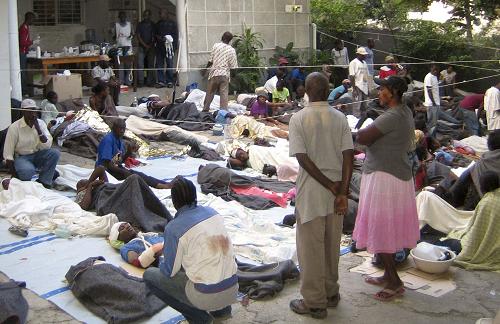Tens of thousands feared dead after Haiti quake
Dazed survivors wandered past dead bodies in rubble-strewn streets Wednesday, crying for loved ones, and rescuers searched collapsed buildings as officials feared the death toll from Haiti's devastating earthquake could reach into the tens of thousands.

The first cargo planes with food, water, medical supplies, shelter and sniffer dogs headed to the Western Hemisphere's poorest nation a day after the magnitude-7 quake flattened much of the capital of 2 million people.
Tuesday's earthquake brought down buildings great and small — from shacks in shantytowns to President Rene Preval's gleaming white National Palace, where a dome tilted ominously above the manicured grounds.
Hospitals, schools and the main prison collapsed. The capital's Roman Catholic archbishop was killed when his office and the main cathedral fell. The head of the UN peacekeeping mission was missing in the ruins of the organization's multistory headquarters.
At a triage center improvised in a hotel parking lot, people with cuts, broken bones and crushed ribs moaned under tent-like covers fashioned from bloody sheets.
"I can't take it any more. My back hurts too much," said Alex Georges, 28, who was still waiting for treatment a day after the school he was in collapsed and killed 11 classmates. A body lay a few feet away.
"This is much worse than a hurricane," said doctors' assistant Jimitre Coquillon. "There's no water. There's nothing. Thirsty people are going to die."
Bodies were everywhere in Port-au-Prince: those of tiny children adjacent to schools, women in the rubble-strewn streets with stunned expressions frozen on their faces, men hidden beneath plastic tarps and cotton sheets.
Haiti's leaders struggled to comprehend the extent of the catastrophe — the worst earthquake to hit the country in 200 years — even as aftershocks still reverberated.
"It's incredible," Preval told CNN. "A lot of houses destroyed, hospitals, schools, personal homes. A lot of people in the street dead. ... I'm still looking to understand the magnitude of the event and how to manage."
Preval said thousands of people were probably killed. Leading Sen. Youri Latortue told The Associated Press that 500,000 could be dead, but conceded that nobody really knows.
"Let's say that it's too early to give a number," Preval said.
Haiti seems especially prone to catastrophe — from natural disasters like hurricanes, storms, floods and mudslides to crushing poverty, unstable governments, poor building standards and low literacy rates.
In Petionville, next to the capital, people used sledgehammers and their bare hands to dig through a collapsed commercial center, tossing aside mattresses and office supplies. More than a dozen cars were entombed, including a UN truck.
Nearby, about 200 survivors, including many children, huddled in a theater parking lot using sheets to rig makeshift tents and shield themselves from the sun.
 0
0 







Go to Forum >>0 Comments